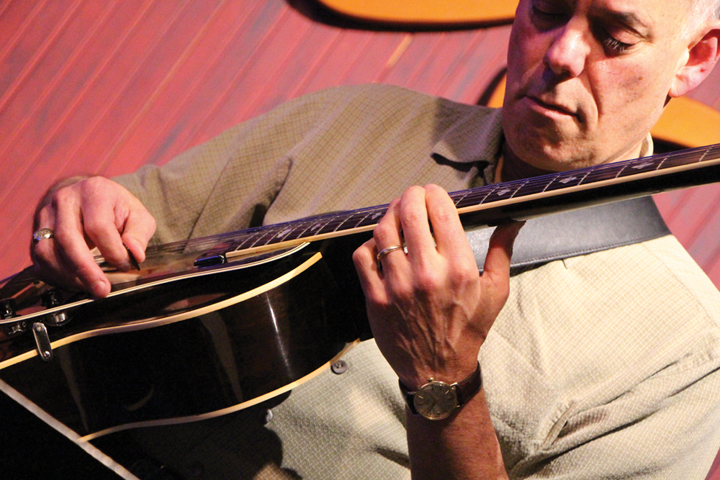
For jazz guitarist John Stein, making music is like having a conversation.
Good conversation requires listening as well as talking. Too much of one or the other knocks things out of whack and leads to a one-sided experience.
For musicians in an ensemble, that conversation starts and continues among themselves and then opens up to include their audience.
Stein plans to contribute to the musical conversation for the radio show “12th Street Jump” from 7:30-9 p.m. Wednesday, May 23, at Black Dolphin, 1813 Grand Blvd. in Kansas City, Missouri. The show will be recorded and broadcast the following week and later on the 59 stations that carry “12th Street Jump,” including KCUR 89.3, which will air the show at midnight Saturday, June 2. The show (12thstreetjump.org) is distributed by PRX.
Stein is also a double bassist, composer, author and teacher. He was born and raised in Kansas City, Missouri. He became a Bar Mitzvah at Congregation Beth Shalom in 1962 and graduated from Southwest High School in 1967.
His brother, Rick Stein, lives in Lawrence. Their parents have passed away. Their stepmother, Pat Stein, and stepfather, Bob Smith, live in the Kansas City area.
Stein lives in the Jamaica Plain neighborhood of Boston, Massachusetts. He is a professor in the harmony department of the Berklee College of Music in Boston, where he received a bachelor’s degree in music. He’s also a working musician; samples of his music are available at johnstein.com.
“To me, all art is human communication, and music is no different,” he said. “So my goal always is to listen to the people I’m playing with and respond. Jazz musicians work very hard to improvise and develop their melodies. It can be incredibly impressive. If the musicians are interacting with one another, then it becomes exciting with the audience.
“What I’m always trying to do is learn to hear better — withhold a little bit of what you’re doing to listen to what your partners are doing,” he said. “That makes it interactive. To the extent that I do that, that’s how happy I am at a gig.”
Mark Edelman is the producer of “12th Street Jump” and president of the Theater League. He grew up with Stein and they went to Hebrew school together.
“He was just incredibly talented, and I wasn’t,” Edelman said. “We were playing old jazz guitars back then. I was less enthralled with it than he was.”
Edelman started producing “12th Street Jump” in 2009. The jazz and blues show combines music and sketch comedy. Each show typically celebrates a famous jazz musician’s birthday, so Edelman looks to book musicians who can re-create that musician’s work, he said.
He is featuring Stein on the show “because of his own personal notoriety and a nationally recognized body of work.”
“We’re interested in having Kansas City-based or otherwise Kansas City-related musicians whenever we can,” Edelman said.
Stein started playing guitar at age 7 and took lessons in musical fundamentals, folk and classical from Charlene Kunitz. He studied jazz guitar with Don Wentzel for about a year starting at age 13 and then studied in high school with Tommy Davis.
He also played in a rock band called The Fabulous Reflections in high school. He found it remarkable that he had been exposed to more-sophisticated musical concepts than were normally used in rock.
The band went to a Kansas City recording studio and made a record with an original song by bandmate David Morgan on one side and a cover of “You Can’t Do That” by the Beatles on the other. On listening to the record, Stein was struck by the major seventh chords he was playing, because of their relative sophistication.
He prefers jazz because it’s “the most sophisticated and requires the most knowledge.”
“Jazz influences everything,” he said. “It comes from the Western music tradition that came through the classical world — the same scales, chord forms and harmonic relationship. It’s influenced by African traditions combined with Western traditions, and one of the things that’s most influential on it is music from Brazil.”
Jazz currently has a small popularity, but the genre is vibrant, he said.
“It isn’t disappearing,” he said. “I’m a huge student of it. Kansas City played a huge part in the 1930s and ‘40s. It was bluesy and swingy — Count Basie and Charlie Parker. Parker was one of the most seminal musicians who influenced the history of jazz.”
Stein has been heavily influenced by Brazilian music and has gone to Brazil many times to play music. He got his first jazz record in seventh grade. It featured Stan Getz and João Gilberto, who “in some ways invented Brazilian bossa nova guitar playing.”
Stein’s most recent albums are “Color Tones” and “Wood and Strings,” both released last year on the Whaling City Sound label.
On Berklee College of Music’s website, Stein writes: “Music is an interesting thing. Much of music is emotional. It’s human expression, and you can’t teach that, of course. And you can’t teach artistry. You can only teach the craft of music. But the actual material that I teach — the nuts and bolts — is something that, once you internalize it, you can use to create great art. Every moment of my music-making includes the material that I teach. It informs what I do intuitively to a great extent.”
No matter where Stein goes to create his musical art, he takes part of Kansas City with him.
“I feel my Kansas City roots, and it’s affected the pace of my life and who I am.”


